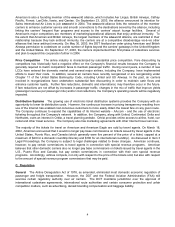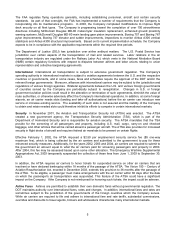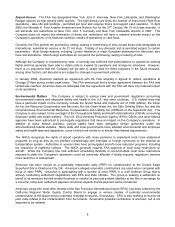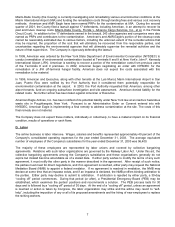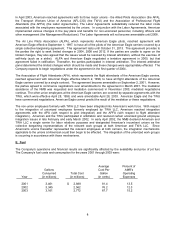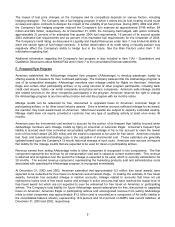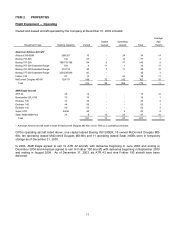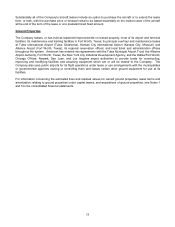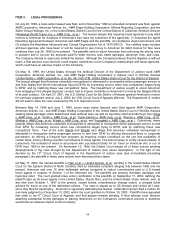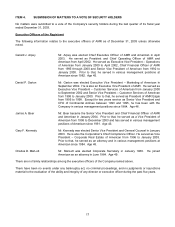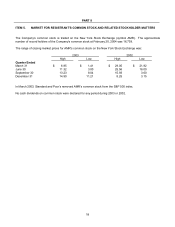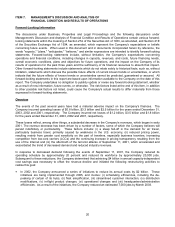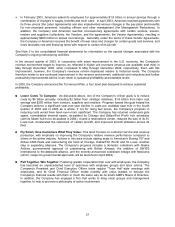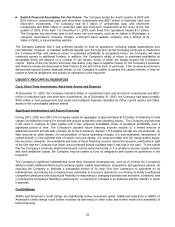American Airlines 2003 Annual Report Download - page 16
Download and view the complete annual report
Please find page 16 of the 2003 American Airlines annual report below. You can navigate through the pages in the report by either clicking on the pages listed below, or by using the keyword search tool below to find specific information within the annual report.
14
ITEM 3. LEGAL PROCEEDINGS
On July 26, 1999, a class action lawsuit was filed, and in November 1999 an amended complaint was filed, against
AMR Corporation, American Airlines, Inc., AMR Eagle Holding Corporation, Airlines Reporting Corporation, and the
Sabre Group Holdings, Inc. in the United States District Court for the Central District of California, Western Division
(Westways World Travel, Inc. v. AMR Corp., et al.). The lawsuit alleges that requiring travel agencies to pay debit
memos to American for violations of American’s fare rules (by customers of the agencies): (1) breaches the Agent
Reporting Agreement between American and AMR Eagle and the plaintiffs; (2) constitutes unjust enrichment; and
(3) violates the Racketeer Influenced and Corrupt Organizations Act of 1970 (RICO). The certified class includes
all travel agencies who have been or will be required to pay money to American for debit memos for fare rules
violations from July 26, 1995 to the present. The plaintiffs seek to enjoin American from enforcing the pricing rules
in question and to recover the amounts paid for debit memos, plus treble damages, attorneys’ fees, and costs.
The Company intends to vigorously defend the lawsuit. Although the Company believes that the litigation is without
merit, a final adverse court decision could impose restrictions on the Company’s relationships with travel agencies,
which could have an adverse impact on the Company.
On May 13, 1999, the United States (through the Antitrust Division of the Department of Justice) sued AMR
Corporation, American Airlines, Inc., and AMR Eagle Holding Corporation in federal court in Wichita, Kansas
(United States v. AMR Corporation, et al, No. 99-1180-JTM, United States District Court for the District of Kansas).
The lawsuit alleged that American unlawfully monopolized or attempted to monopolize airline passenger service to
and from Dallas/Fort Worth International Airport (DFW) by increasing service when new competitors began flying
to DFW, and by matching these new competitors’ fares. The Department of Justice sought to enjoin American
from engaging in the alleged improper conduct and to impose restraints on American to remedy the alleged effects
of its past conduct. On April 27, 2001, the U.S. District Court for the District of Kansas granted American’s motion
for summary judgment, and on July 3, 2003, the 10th Circuit Court of Appeals affirmed. The Department of Justice
did not seek to have the case reviewed by the U.S. Supreme Court.
Between May 14, 1999 and June 7, 1999, seven class action lawsuits were filed against AMR Corporation,
American Airlines, Inc., and AMR Eagle Holding Corporation in the United States District Court in Wichita, Kansas
seeking treble damages under federal and state antitrust laws, as well as injunctive relief and attorneys’ fees (King
v. AMR Corp., et al.; Smith v. AMR Corp., et al.; Team Electric v. AMR Corp., et al.; Warren v. AMR Corp., et al.;
Whittier v. AMR Corp., et al.; Wright v. AMR Corp., et al.; and Youngdahl v. AMR Corp., et al.). Collectively, these
lawsuits allege that American unlawfully monopolized or attempted to monopolize airline passenger service to and
from DFW by increasing service when new competitors began flying to DFW, and by matching these new
competitors’ fares. Two of the suits (Smith and Wright) also allege that American unlawfully monopolized or
attempted to monopolize airline passenger service to and from DFW by offering discounted fares to corporate
purchasers, by offering a frequent flyer program, by imposing certain conditions on the use and availability of
certain fares, and by offering override commissions to travel agents. The suits propose to certify several classes of
consumers, the broadest of which is all persons who purchased tickets for air travel on American into or out of
DFW from 1995 to the present. On November 10, 1999, the District Court stayed all of these actions pending
developments in the case brought by the Department of Justice (see above description). In the light of the
decision by the 10th Circuit Court of Appeals in the Department of Justice case (see immediately preceding
paragraph), the plaintiffs in these class actions have dismissed their claims.
On May 17, 2002, the named plaintiffs in Hall, et al. v. United Airlines, et al., pending in the United States District
Court for the Eastern District of North Carolina, filed an amended complaint alleging that between 1995 and the
present, American and over 15 other defendant airlines conspired to reduce commissions paid to U.S.-based
travel agents in violation of Section 1 of the Sherman Act. The plaintiffs are seeking monetary damages and
injunctive relief. The court granted class action certification to the plaintiffs on September 17, 2002, defining the
plaintiff class as all travel agents in the United States, Puerto Rico, and the United States Virgin Islands, who, at
any time from October 1, 1997 to the present, issued tickets, miscellaneous change orders, or prepaid ticket
advices for travel on any of the defendant airlines. The case is stayed as to US Airways and United Air Lines,
since they filed for bankruptcy. American is vigorously defending the lawsuit. Defendant carriers filed a motion for
summary judgment on December 10, 2002, which the court granted on October 30, 2003. Plaintiffs have appealed
that order to the 4th Circuit Court of Appeals, and that appeal remains pending. A final adverse court decision
awarding substantial money damages or placing restrictions on the Company’s commission policies or practices
would have an adverse impact on the Company.


